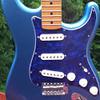pineapple_geoff

Joined: Apr 24, 2006
Posts: 119
MV Mi Amigo
|

Posted on Oct 22 2007 10:42 PM
I'm having a "no brainer" and my big guitar book (that often doubles as my brain) didnât have the answer. So, first an easy question â
in a traditional major scale, the chords go â I major II minor III minor IV major V major VI minor VII diminished right ?
Whatâs it for a minor scale again tooâ¦â¦â¦â¦â¦â¦â¦â¦â¦â¦.?
Anyway, onto my question -
I saw this posts http://www.surfguitar101.com/modules.php?name=Forums&file=viewtopic&t=3970 and started wondering how all these chords could relate to one another. Does surf music break with the traditional major, minor etc scale pattern in major and minor scales for chords much ? are there common changes ?
PG
|
Kawentzmann

Joined: Feb 27, 2006
Posts: 1062
Berlin, Germany

|

Posted on Oct 23 2007 02:38 AM
pineapplegeoff_
â¦
I saw this posts http://www.surfguitar101.com/modules.php?name=Forums&file=viewtopic&t=3970 and started wondering how all these chords could relate to one another. Does surf music break with the traditional major, minor etc scale pattern in major and minor scales for chords much ? are there common changes ?
PG
If you keep the number of chords small itâs more easy to have obvious relationships. So the most common chords are the three rockânâroll chords plus two or three in between. But don't worry: every chord relates to every other chord! I find music a bit boring that doesnât break a pattern here an there - and I love surf!
— The Exotic Guitar of Kahuna Kawentzmann
You can get the boy out of the Keynes era, but you can’t get the Keynes era out of the boy.
|
WR

Joined: Feb 27, 2006
Posts: 3832
netherlands




|

Posted on Oct 23 2007 02:54 AM
In any scale, the base chords are simply triads of scale-notes built on a particular chord note. you can figure the rest out easily. A minor 5 is often subbed with a major V cause the 3th will be a leading note to the I.... think E chord in Am scale, the harmonic minor thing.
Or if you want to put it more complex, and integrate parrallel theory, you'd say, if a dominant or subdominant contains a full step distance to a note of the tonica, that notes often changed to a half step distance to the tonica note to make for a passing note. classic examples, raised 5th on the V going to the major 3th of I (G#5 - C ).... a variation is to have the #5 not lead up to the 3th of the I, but down to the 9 ( G#5 - C9) .... or take the VII in a major scale, (diminshed) but raise the b5 and the minor 3 a half step (play F - B7 - C ).... IV - #IVdim-I is a trad as well. or with the subdomiant in a major scale, play IV, minorIV -I
etc etc. if you're intested in all this, just spend time with your guitar or a piano, play known progressions and look at your fretboard and try to unrstand what's happening./ play the passing notes indivudally and then play the chords and see if you hear those articular notes doing their work.
rock and roll, I have to add though, doesnt give a toss about all this, and doesnt conform.  
— Rules to live by #314:
"When in Italy, if the menu says something's grilled, don't assume it is."
https://www.facebook.com/The-Malbehavers-286429584796173/
|
WR

Joined: Feb 27, 2006
Posts: 3832
netherlands




|

Posted on Oct 23 2007 02:57 AM
PS Klas posted just while I was typing
I find music a bit boring that doesnât break a pattern here an there
<= he said it best!
I typed all the above with my tongue firmly planted in my cheeck btw! I leaed all that stuff and it's handy but usually I dont pay much attention!
— Rules to live by #314:
"When in Italy, if the menu says something's grilled, don't assume it is."
https://www.facebook.com/The-Malbehavers-286429584796173/
|
Kawentzmann

Joined: Feb 27, 2006
Posts: 1062
Berlin, Germany

|

Posted on Oct 23 2007 09:18 AM
WR
PS Klas posted just while I was typing
I find music a bit boring that doesnât break a pattern here an there
<= he said it best!
I typed all the above with my tongue firmly planted in my cheeck btw! I leaed all that stuff and it's handy but usually I dont pay much attention!
Yeh! Church key is actually not in a church key!
— The Exotic Guitar of Kahuna Kawentzmann
You can get the boy out of the Keynes era, but you can’t get the Keynes era out of the boy.
|
WR

Joined: Feb 27, 2006
Posts: 3832
netherlands




|

Posted on Oct 23 2007 09:23 AM

— Rules to live by #314:
"When in Italy, if the menu says something's grilled, don't assume it is."
https://www.facebook.com/The-Malbehavers-286429584796173/
|
pineapple_geoff

Joined: Apr 24, 2006
Posts: 119
MV Mi Amigo
|

Posted on Oct 25 2007 01:25 AM
I find all this stuff really interesting. Doesnât anyone else ?
Surely, I can't be the only music theory nerd in cyberspace !
Anyways, the reason I asked is that I know some of the 60s garage stuff seems to ignore the major chord/minor chord thing and there are a few songs that just seem to be major chords the whole way through.
So, I was wondering if thereâs anything like that in surf ? Some songs seem to alternate between major and minor chords for the same chord, yeah ? Am I rightâ¦â¦â¦..?
PG (alias âmusic theory nerdâ):hmmm:
|
mournblade

Joined: Sep 27, 2006
Posts: 328
central Pennsylvania
|

Posted on Nov 23 2007 09:37 AM
pineapplegeoff_
I find all this stuff really interesting. Doesnât anyone else ?
Surely, I can't be the only music theory nerd in cyberspace !
PG (alias âmusic theory nerdâ):hmmm:
===>Nah, you're not alone. I was a music minor in college (philosophy
major--what a killer combo!); studied primarily Baroque composition.
Anyhoo, the chord progression for a minor scale is the same as the
major scale, EXCEPT you start two chords down. For example, in E Major:
I Major
ii minor
iii minor
IV Major
V Major
vi minor
vii diminished
VIII Major (same as I)
E Major's relative minor is C minor:
i minor
ii diminished
III Major
iv minor
v minor ()
VI Major
VII Major
viii minor
() Using the harmonic minor scale (if I recall correctly), the sixth note in
a minor scale would be "sharped" (to coin a word), effectively raising this
chord to a Major. Please correct me if I'm wrong--I only just woke up.
Anyway, yes, I am fascinated by music theory, and am always trying to
experiment with what's out there.
Vincent
— Is this something you can share with the rest of us, Amazing Larry?!?
|
tenderfoot

Joined: Feb 01, 2007
Posts: 308
Ellicott City, Maryland
|

Posted on Nov 23 2007 09:53 AM
The measurement of all the music theory happens in your ear. An augmented chord could be explained scientifically, but more importantly to the artist is the sound and feeling it delivers. So, with time and practice one shouldn't need to think with your mind about the scales and chord relationships as much as you should hear and feel it and let your instinct guide you.
That being said, music theory is interesting.
|
revmike

Joined: Feb 26, 2006
Posts: 3846
North Atlantic








|

Posted on Nov 23 2007 06:19 PM
Using the harmonic minor scale (if I recall correctly), the sixth note in
a minor scale would be "sharped" (to coin a word), effectively raising this
chord to a Major. Please correct me if I'm wrong--I only just woke up.
The harmonic minor scale raises the 7th note of the (natural) minor scale, while the less used (in surf) melodic minor raises the 6th and 7th note of the scale:
Natural Minor: A B C D E F G A
Harmonic Minor: A B C D E F G# A
Melodic Minor: A B C D E F# G# A
The chords would be
Natural Minor: Am Bdim C Dm Em F G Am
Harmonic Minor: Am Bdim Caug Dm E F G#dim Am
Melodic Minor: Am Bm Caug D E F#dim G#dim Am
Mix and match them, and ultimately let your ear determine what sounds good.
Remember that aural music came first, then theory came along to explain the most common trends.
Rev
— Canadian Surf
http://www.urbansurfkings.com/
|

































